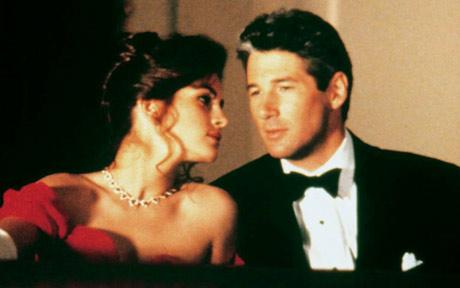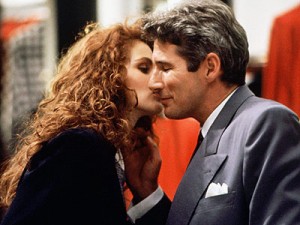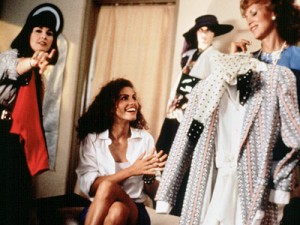From the Chicago Reader (July 13, 1990). I wish I could remember now which Reader staffer thought up the brilliant headline; it wasn’t me. — J.R.
PRETTY WOMAN
(Worthless)
Directed by Garry Marshall
Written by J.F. Lawton
With Richard Gere, Julia Roberts, Ralph Bellamy, Jason Alexander, Laura San Giacomo, Alex Hyde-White, and Hector Elizondo.
Having missed Pretty Woman when it opened more than three months ago, I figured I would just let it pass, but ultimately curiosity got the better of me. I’m not a big fan of either Richard Gere or Julia Roberts, but finally I had to see for myself how a movie that seemed to celebrate prostitution (at the same time it trashes prostitutes) — brought to us by the Disney studio, the same people responsible for such squeaky-clean family entertainments as Dick Tracy and the rerelease of The Jungle Book — could become one of the biggest hits of the year.
Now that I’ve seen it, I still think Pretty Woman celebrates prostitution while trashing real-life prostitutes, but not in the way that I originally imagined, and not in a way that is readily apparent. In fact the film manages to espouse prostitution while cleverly concealing the fact that it is doing so. In keeping with the hallowed Disney tradition, Pretty Woman is a fairy tale and a paean to big business; it also happens to be a guarded defense of prostitution — an ideological sleight of hand that earns it an R rating, but also makes it a fairy tale as fanciful and pie-eyed as the famous Disney cartoons.
Edward Lewis (Richard Gere), an emotionally stunted multimillionaire from New York, is in Los Angeles on business. Leaving a party, he asks directions from Vivian (Julia Roberts), a street hooker, and winds up booking her for the night. Advised by his lawyer (Jason Alexander) that a female companion would come in handy for his social/business engagements, and charmed by Vivian’s beauty and directness, he proposes to rent her for the week, and they negotiate a fee — $3,000 plus clothing and meals.
Vivian, still dressed in her gaudy hooker clothes, is snubbed and humiliated in a Rodeo Drive boutique, but then enlists the assistance of a hotel manager (Hector Elizondo) and later Edward himself in purchasing her wardrobe for the week. Edward, meanwhile, in the course of planning the takeover of a ship-building company, reveals to Vivian that his estrangement from his recently deceased father is behind both his corporate ruthlessness and his emotional blockage. Thanks to Vivian, however, who gradually falls in love with him, he begins to become more human, and, without his lawyer’s knowledge, works out a friendly merger between himself and the shipbuilder (Ralph Bellamy).
He wants to set Vivian up as his mistress in New York, but she refuses, explaining that he’s still treating her like a prostitute, and recounts her highly original childhood fantasy of being rescued from a tower by a knight in shining armor. But when he turns up later with a bouquet of flowers at her apartment — just as she’s leaving to start a new life in San Francisco — and climbs the fire escape to her window to “rescue” her, she agrees to “rescue him right back.”
For this plot to work as a romantic comedy, the institutions represented by Edward and Vivian, big business and prostitution, both have to be given a careful dry-cleaning — above all they must be treated as separate rather than interlocking activities, unrelated businesses that could benefit from a “merger.” Thus, according to this movie’s assumptions, hookers like Vivian and her roommate Kit (Laura San Giacomo) are by definition poorly educated but otherwise reasonably happy independent contractors who willingly chose their profession and work without pimps, bosses, or syndicates — and therefore have nothing whatsoever to do with big business in any shape or form.
By the same token, a ruthless corporate mogul like Edward is basically OK — even sensitive: he plays classical piano, attends the opera, and reads aloud from Shakespeare to the grateful semi-literate Vivian, who never finished high school. (By contrast, Edward went “all the way” in his own education.) He’s only become destructive and emotionally crippled because he couldn’t hit it off with his old man (a banker and one of the first of his corporate victims); as soon as he decides to “build things” with the shipbuilder instead of take over his company and sell it off in pieces, he’s clearly on the right track. It doesn’t matter in the slightest whether these “things” happen to be, say, nuclear submarines or aircraft carriers — as well they might be, since the company has Navy contracts — the only important issue is mending the rift between Edward and this new father figure so Edward can receive his approval (“I’m proud of you”), never mind for what.
The movie skims off the most appealing aspects of both Edward and Vivian, asks us to identify with them, and encourages us to ignore the rest, so that we never get any sustained opportunity to reflect on Edward as a supporter of prostitution or Vivian as an economic victim of his whims without a shred of equality. (The movie is careful to show during their first encounter that she knows more than he does about how to drive a Porsche, and later, when she feels insulted, has her stomp out of the penthouse leaving the money behind — both scenes apparently intended to relax the feminists in the audience.) To make sure we’re coaxed into a proper frame of mind, the movie even provides us with an elevator boy, a stock comic figure whose hammy grimaces tell us how we’re supposed to react to certain scenes.
The movie is quite explicit about Edward and Vivian having somewhat related professions (“You and I are such similar creatures,” he tells her. “We both screw people for money”), but much less explicit about the relationship of both of their businesses to commodities and consumption. Considering the fact that this is basically a movie about shopping, this mystification is quite a feat. The sexual-economic pun in Edward’s wisecrack points to a dualism that runs all the way through the picture; when, for instance, Edward takes Vivian into a Beverly Hills boutique, he tells a clerk that he intends to spend (my italics) “an obscene amount of money,” and therefore they need “some major sucking up” — two phrases that seemed to provoke audible surges of sexual excitement in the audience.
In many respects, though, the movie’s real focus is neither sex nor money per se but the awe and class anxiety experienced by Vivian when she moves off the street and into Edward’s hotel, the Regent Beverly Wilshire — awe and anxiety the audience clearly shares. Like her, we’re expected to say “Wow” when we enter the hotel lobby, and when we enter Edward’s sumptuous penthouse suite, we’re supposed to be too amazed even for words. Champagne served with strawberries, a montage of Rodeo Drive shop signs and window displays, a fancy restaurant, a flight in a private plane to San Francisco to attend the opera, are all meant to evoke a hushed, almost religious response, as well as nervousness about behaving the “wrong way” in relation to such holy privileges–as Vivian often does, providing most of the film’s laughs. Gulping the champagne too quickly before getting to the strawberries, being humiliated and then later taking her revenge in the Rodeo Drive boutiques, causing an accident with the restaurant silverware, and responding to the opera by saying, “It’s so good I almost peed in my pants” (which Edward translates to a nearby dowager as, “She said she liked it almost as much as The Pirates of Penzance“): these moments provide frissons roughly equivalent to the one when Woody Allen sneezed into a heap of cocaine in Annie Hall. That is, they cater both to the audience’s voyeuristic interest in opulence and to a nervousness about behaving “correctly” in the presence of such conspicuous consumption.
Edward’s behavior, of course, is supposed to be tasteful and refined, not conspicuous and vulgar. Unlike Vivian’s roommate, you’d never catch him taking drugs, and in fact he’s all ready to eject Vivian from his penthouse when he (wrongly) suspects her of it. Although he’s afraid of heights — a symbolic touch that’s clearly related to his patriarchal hangup — he explains to Vivian that he took the penthouse suite because it’s the “best,” just as he books box seats at the opera because they’re the “best.” What the “best” really means, of course, is most conspicuous (box seats have notoriously poor sight lines) but it’s part of the basic lie of this movie that extreme wealth automatically grants you the best that life, including culture, has to offer. (The “best” is also represented by Edward’s hardcover edition of Shakespeare quotations — rather than, say, paperback editions of individual Shakespeare plays, which Vivian could presumably afford to buy and read on her own, without her sugar daddy’s beneficence.)
According to this movie’s value system, Edward’s wealth and Vivian’s vulgarity are so distinct and separate that they form a sexual dialectic, a winning combination. (The movie’s casting works hand in glove with this idea, contrasting Gere’s smug self-satisfaction with Roberts’s outgoing openness.) One of the ways that they’re kept distinct and separate is through the narrative functions of a couple of secondary characters, both middlemen designed to keep Edward pure and spotless — Edward’s lawyer and the hotel manager. The lawyer, a longtime friend and associate of Edward’s, becomes a villain when he discovers that Vivian is a hooker and proceeds to “treat her like one” (i.e., with leering contempt and attempted rape); the manager treats her like a hooker and then becomes her ally once her relationship to Edward is clearly established.
In both cases, it’s Vivian’s relationship with Edward and his money that sanctifies her, and her profession that degrades her — while Edward remains relatively untarnished even during his transactions with her. A marriage proposal is implied without being stated in the final clinch, and an earlier line of dialogue suggests that prostitution plus “love” equals therapy at bargain rates; either way, the overall implication appears to be that as long as Edward’s money is clean — validated by high culture and the shipbuilder — a long-term lease is no longer prostitution but the happy ending of a fairy tale. Conceivably, even Uncle Walt would have approved.





